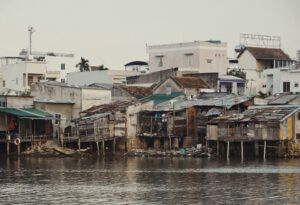Assessing Slums in the Development Context
Introduction:
Slums play many roles in city life. As the place of residence of low-cost labor, they keep the wheels of the city working in many different ways. As a first stopping point for immigrants, they provide low-cost housing that will enable the immigrants to save for their eventual absorption into society. They are adept at producing the services and commercial activities that the formal sector fails to provide through the mobilization of local enterprises and industries. Slums are extremely varied places that defy anyone’s tight definition. Many are slums because they are unrecognized by the officials of the local authority and government. This lack of recognition informality is both a characteristic and cause of problems of inadequacy. Slums, poverty, and they are closely related but are by no means congruent.
The story of slums is, therefore, neither heterogeneous nor coherent and homogenous. It is a story of rich variety, great achievement and typical 21st-century urban life. When more than half of the urban population lives in them, the slums become the dominant city. This is the case in many countries and needs to be recognized so that slums are awarded their rightful place in the centre of policies and politics.
Social Dimensions:
Slums have grown as a seemingly inevitable part of modern urban life. Low-income people find the cheap accommodation helpful in their need to keep housekeeping costs low enough to afford. To do this, they tolerate much less than ideal conditions, no doubt hoping to improve and move to somewhere better. If the cheap accommodation is also well placed for employment, so much the better. Where they are not well placed for work or where formal work is not available or not sought, slum housing often plays host to a lively community of home-based enterprises of all sorts, providing the services and employment opportunities unfulfilled by planned cities.
Historical Context And Evolution Of Social Stratification Patterns:
Cities are complex systems. As societies urbanize, their economies become increasingly differentiated. Their organization increasingly revolves around specialized activities in the production, consumption and trade of goods and services. Urban dwellers process, store and sell foodstuffs, repair equipment, loan money, build roads and structures, collect taxes, care for the sick, cobble shoes, tailor clothes, hold court, worship, run schools and government, enact and enforce laws, and – very significantly – operate markets. These activities crystallize in particular professional and occupational roles. These roles, in turn, are attached to positions that help provide access to the things that people need or wish for in life, such as food, shelter, health care and education.
Views on inner-city slums:
Today, the vast bulk of areas with inadequate housing and slums is in the developing world; but it is important to remember that during the early years of urbanization and industrialization in the North, urban conditions were at least as bad as those anywhere today and slums were just as widespread.
Slums and urbanization:
Slum areas were first defined by the ‘regimen of congestion’ that characterized the new mercantile cities of the 16th century as too many people began competing for too few dwellings and rooms. The rapid influx to the cities of poor migrants looking for jobs created a huge need for accommodation. Much of the new housing for immigrants was developed or redeveloped by speculators seeking profits, and, in the absence of controls, was built to increasingly higher densities and poorer quality. If this new housing was not built quickly enough or was still not affordable, the obvious ‘instant’ solution for residents was to reduce the costs of housing by sharing the space and the rent with others. Landlords were quick to seize this opportunity, renting their properties out by the room and making a greater profit than they did from the same property rented out as a single unit.
Slums and capitalism:
The growth of urban slums is intimately tied to the change from earlier economic systems to capitalism, and most of slums’ worst features are intimately associated with conditions of inequality, profit seeking, exploitation and social disruption that occur until the institutions are slowly built that mollify the excesses of the new market system.
Slums and reformism:
The question arises as to why a notion of slum was developed only from the 1820s and not before, since slums had been around for several hundred years. This appears, partly, to be due to the fact that urban conditions had improved to such an extent by this stage that slums could actually be identified against a general background of better quality housing, which had not been the case in the early phases of the Industrial Revolution. Slums were, therefore, a term of the middle class to show how they had bettered their position.

Conclusion:
It would seem that most low-income earners, without subsidy and given a choice on how to spend their limited budgets, would choose the cheapest housing that meets their basic requirements for shelter, security and access to income and cultural opportunities. It is likely that such a choice would favour informal housing that does not meet the high building standards developed for more affluent households. The housing stock of cities in less developed parts of the world reflects this profile.
